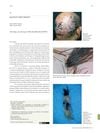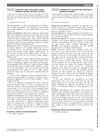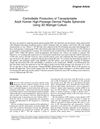60 citations,
August 2022 in “ESMO Open” Trastuzumab deruxtecan is effective for HER2-positive breast cancer but requires careful management of side effects.
 15 citations,
February 2019 in “Journal of clinical medicine”
15 citations,
February 2019 in “Journal of clinical medicine” Atorvastatin reversed memory problems caused by cancer drug trastuzumab and improved its cancer-fighting abilities without causing hair loss.
 3 citations,
August 2023 in “Drug safety”
3 citations,
August 2023 in “Drug safety” Proactive monitoring and management are essential to maximize the benefits of Trastuzumab Deruxtecan while minimizing serious side effects.
 67 citations,
May 2010 in “Journal of The American Academy of Dermatology”
67 citations,
May 2010 in “Journal of The American Academy of Dermatology” Some chemotherapy can cause permanent hair loss.
 June 2017 in “Reactions Weekly”
June 2017 in “Reactions Weekly” Some breast cancer treatments caused long-term hair loss in women, similar to a condition called alopecia areata.
 December 2013 in “Nursing2023”
December 2013 in “Nursing2023” The FDA approved a new breast cancer treatment, found flu shots may reduce heart risks, questioned the safety of fast-tracked drug approvals, showed statins don't help with certain pneumonia, and approved a new dementia imaging agent.
 108 citations,
December 2003 in “Clinical breast cancer”
108 citations,
December 2003 in “Clinical breast cancer” PLD is an effective and safer alternative for treating breast cancer.
 23 citations,
December 2015 in “Anais Brasileiros de Dermatologia”
23 citations,
December 2015 in “Anais Brasileiros de Dermatologia” Permanent hair loss after bone marrow transplant can be caused by chemotherapy or chronic graft-versus-host disease.
 3 citations,
July 2018 in “Cureus”
3 citations,
July 2018 in “Cureus” A breast cancer patient had lasting hair loss after chemotherapy, which improved with minoxidil treatment.
 2 citations,
February 2019 in “Anais brasileiros de dermatologia/Anais Brasileiros de Dermatologia”
2 citations,
February 2019 in “Anais brasileiros de dermatologia/Anais Brasileiros de Dermatologia” Tufted folliculitis is common in patients with folliculitis decalvans.
 2 citations,
May 2012 in “Annals of Oncology”
2 citations,
May 2012 in “Annals of Oncology” Patients with advanced breast cancer and high hormone receptor levels who had surgery for ovarian/pelvic metastases lived longer, especially if they had high estrogen receptor levels.
 1 citations,
April 2012 in “Informa Healthcare eBooks”
1 citations,
April 2012 in “Informa Healthcare eBooks” Some medications for inflammation can cause a condition with scalp rashes and hair loss, often linked to Crohn's disease, and may require treatment changes to prevent permanent hair loss.
 March 2020 in “Section 5: Patient safety and quality assurance”
March 2020 in “Section 5: Patient safety and quality assurance” Tofacitinib and baricitinib had an acceptable level of side effects in rheumatoid arthritis patients.
 1461 citations,
March 2004 in “Annals of oncology”
1461 citations,
March 2004 in “Annals of oncology” Pegylated liposomal doxorubicin is as effective as conventional doxorubicin but causes fewer heart problems and side effects.
 403 citations,
December 2018 in “Cell stem cell”
403 citations,
December 2018 in “Cell stem cell” Understanding phenotypic plasticity is crucial for developing effective cancer therapies.
 403 citations,
November 2005 in “Journal of Endocrinology”
403 citations,
November 2005 in “Journal of Endocrinology” Dehydroepiandrosterone (DHEA) is a prohormone important for producing sex steroids and has potential health benefits.
 310 citations,
November 2011 in “Environment International”
310 citations,
November 2011 in “Environment International” Anticancer drugs are increasingly found in surface waters, and their long-term environmental effects are not well understood, requiring better testing methods.
 222 citations,
October 2014 in “Annual Review of Pharmacology and Toxicology”
222 citations,
October 2014 in “Annual Review of Pharmacology and Toxicology” Eph receptors and ephrins may be promising targets for treating diseases, but more understanding is needed for effective and safe therapies.
 114 citations,
March 2002 in “Current opinion in oncology/Current opinion in oncology, with cancerlit”
114 citations,
March 2002 in “Current opinion in oncology/Current opinion in oncology, with cancerlit” Cancer therapy can cause various skin problems, including hair loss, skin darkening, painful hand-foot syndrome, and severe skin damage.
 112 citations,
January 2014 in “Molecular and cellular therapies”
112 citations,
January 2014 in “Molecular and cellular therapies” Blocking the Wnt pathway could lead to new treatments for cancer and tissue repair but requires careful development to avoid side effects.
 76 citations,
November 2009 in “Medical Clinics of North America”
76 citations,
November 2009 in “Medical Clinics of North America” Hormones, especially androgens, play a key role in acne, which can be a symptom of systemic diseases like PCOS and may require targeted treatment.
 68 citations,
April 2014 in “Journal of Molecular Endocrinology”
68 citations,
April 2014 in “Journal of Molecular Endocrinology” The document concludes that targeting the androgen receptor may be a promising breast cancer treatment, especially for certain types.
 68 citations,
May 2012 in “Annals of Oncology”
68 citations,
May 2012 in “Annals of Oncology” Some breast cancer chemotherapy can cause permanent hair loss.
 64 citations,
July 2011 in “Dermatologic Therapy”
64 citations,
July 2011 in “Dermatologic Therapy” Scalp cooling can prevent chemotherapy-induced hair loss, and certain treatments can speed up hair regrowth, but more research is needed for better treatments.
 62 citations,
February 2011 in “Expert review of dermatology”
62 citations,
February 2011 in “Expert review of dermatology” Scalp cooling can reduce chemotherapy-induced hair loss and should be available in all hospitals.
 59 citations,
August 2018 in “The oncologist”
59 citations,
August 2018 in “The oncologist” Some breast cancer patients still experience hair loss three years after chemotherapy, especially with taxane-based treatments.
 54 citations,
September 2012 in “Dermatologic Clinics”
54 citations,
September 2012 in “Dermatologic Clinics” Some medications can cause hair loss, but stopping the drug usually leads to recovery within 3 months.
 53 citations,
April 2018 in “Journal of The American Academy of Dermatology”
53 citations,
April 2018 in “Journal of The American Academy of Dermatology” Cancer treatments often cause hair disorders, significantly affecting patients' quality of life, and better management methods are needed.
 46 citations,
September 2014 in “Tissue engineering. Part A”
46 citations,
September 2014 in “Tissue engineering. Part A” Researchers created hair-inducing human cell clusters using a 3D culture method.
 45 citations,
January 2020 in “International Journal of Molecular Sciences”
45 citations,
January 2020 in “International Journal of Molecular Sciences” Some natural compounds may help overcome drug resistance in certain cancers, but more research is needed.




























